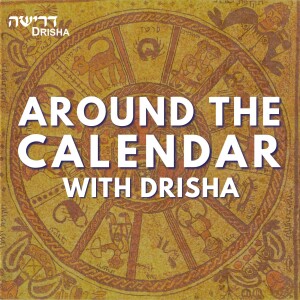Around the Calendar with Drisha
Over the years, Drisha has offered Torah classes on the many observances that mark out the timeline of the Jewish yearly cycle. Around the Calendar brings you all our holiday- and observance-focused classes, from our back catalog of recordings and continuing through our contemporary shiurim and lectures.
Episodes

Friday Dec 15, 2023
Friday Dec 15, 2023
One of the Highlights of the Yom Kippur service is the reenactment of the service of the Kohen Gadol on Yom Kippur. We will take a close look at this central part of the Yom Kippur service and how it reflects the core themes of the day.

Friday Dec 15, 2023
Friday Dec 15, 2023
On the first day of Rosh ha-Shanah we read of how God “visited” or “took note” of Sarah” (Gen 21:1). In this session we will examine an interrelated set of texts in midrash and early piyyut that reflect and expand on this event. These texts will offer subtle insight into the rabbis’ understanding of the Bible, their own narrative aesthetics (i.e., the sorts of stories they like to tell), and the development of rabbinic literature.

Friday Dec 15, 2023
Friday Dec 15, 2023
The Mishnah in Tractate Rosh Hashanah tells of three blessings unique to the Rosh Hashanah service: מלכויות (malkhiyot, or “kingship”), זיכרונות (zikhronot, or “remembrances”), שופרות (shoferot, the shofar and its sounding). But the order of those blessings is the subject of much debate among the Tannaim and Amoraim. How does the text that we find in our siddur/makhzor reflect those various Rabbinic positions? Why are their biblical verses out of order (Writings before Prophets)? And finally, what can we derive from these blessings about Rosh Hashanah?

Friday Dec 15, 2023

Friday Dec 15, 2023
Friday Dec 15, 2023
As the new year begins, Jews around the world make their way down to the water. As we gaze upon the river or pond before us, what are we meant to see? In this course, we'll take a deep dive into Tashlikh, exploring the texts that serve as the basis for the (relatively late) emergence of the ritual. We will look at Tashlikh through three spiritual lenses, finding within this little annual ritual a deep meditation upon cleansing, crisis, and creation.

Friday Dec 15, 2023
Friday Dec 15, 2023
As the new year begins, Jews around the world make their way down to the water. As we gaze upon the river or pond before us, what are we meant to see? In this course, we'll take a deep dive into Tashlikh, exploring the texts that serve as the basis for the (relatively late) emergence of the ritual. We will look at Tashlikh through three spiritual lenses, finding within this little annual ritual a deep meditation upon cleansing, crisis, and creation.

Friday Dec 15, 2023
Friday Dec 15, 2023
Join Dr. Benjamin Sommer to take a close look (in English and Hebrew) at the text recited during Elul and Tishrei, Psalm 27, to see what this text tells us about a mature Jewish faith.

Friday Dec 15, 2023
Friday Dec 15, 2023
Join Dr. Benjamin Sommer to take a close look (in English and Hebrew) at the text recited during Elul and Tishrei, Psalm 27, to see what this text tells us about a mature Jewish faith.

Friday Dec 15, 2023
Friday Dec 15, 2023
Fear of God takes a central place in the High Holiday liturgy. Three times a day for over a week we ask God, “O Lord, instill fear of You in all Your creations.” Yet fear is an emotion we often regard very negatively. Why should we actively ask for fear? Isn’t fear a function of lowliness and oppression?
The Jewish tradition is rife with answers to this and related questions, mostly attempting to complicate the meaning of “fear” (maybe it really means “reverence?”). In this 2-part class, instead of trying to redefine “fear,” we will seek to redeem it, uncovering a deeper understanding of fear’s place in human nature and flourishing. Each session will begin with classical texts from the Western tradition of Political Philosophy, which will provide a new understanding of the role fear plays in human life. We will then use these new understandings to gain new appreciation of a host of classical Jewish texts—from the Hebrew Bible to the modern era—and see how fear (in its simplest sense) can pave the way to freedom, religiosity, and a life of principle (and political radicalism, if that’s your thing).

Friday Dec 15, 2023
Friday Dec 15, 2023
Fear of God takes a central place in the High Holiday liturgy. Three times a day for over a week we ask God, “O Lord, instill fear of You in all Your creations.” Yet fear is an emotion we often regard very negatively. Why should we actively ask for fear? Isn’t fear a function of lowliness and oppression?
The Jewish tradition is rife with answers to this and related questions, mostly attempting to complicate the meaning of “fear” (maybe it really means “reverence?”). In this 2-part class, instead of trying to redefine “fear,” we will seek to redeem it, uncovering a deeper understanding of fear’s place in human nature and flourishing. Each session will begin with classical texts from the Western tradition of Political Philosophy, which will provide a new understanding of the role fear plays in human life. We will then use these new understandings to gain new appreciation of a host of classical Jewish texts—from the Hebrew Bible to the modern era—and see how fear (in its simplest sense) can pave the way to freedom, religiosity, and a life of principle (and political radicalism, if that’s your thing).







